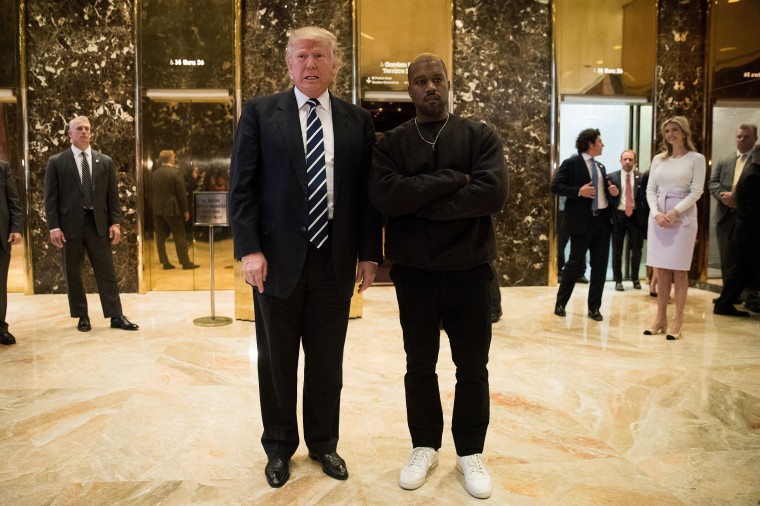Kanye West has, with a series of tweets about President Donald Trump, conservative activists and free thinking, suddenly become the new darling of the conservative movement.
Not that he wasn't a fairly popular before: West is a global hip-hop icon, who has broken into other art media like high fashion and interior design and created no small amount of personal wealth.
And the conservative movement generally loves and is dedicated to everything and everyone that makes money... except popular culture, which often exposes the downsides of neoliberalism, critiques foreign wars, has been more accepting of LGBTQ communities and comments on the failures of racist and sexist institutions. Conservatives have condemned Hollywood at every turn since the McCarthy era and even tried to censor rap music since its entry into the mainstream consciousness. From Nixon to Dan Quayle to the Bushes to Trump, they hate that their lack of compassion (which is oddly and hypocritically wrapped up in Judeo-Christian values) makes them seem utterly square.
It also seemingly frustrates conservatives to no end that their favorite musicians reject them — sometimes on their favorite songs, like with Bruce Springsteen’s classic "Born in the USA."
It also seemingly frustrates them to no end that their favorite musicians reject them — sometimes on their favorite songs, like with Bruce Springsteen’s classic "Born in the USA." Trump struggled to find artists like to perform at his poorly attended inauguration; from Shakira to Cher to Chris Rock, actors, singers and comedians reject and criticize him daily.
West, though, has ended Republicans' A-list celebrity drought by tweeting a picture of himself wearing a MAGA hat and sending awkward tweets lauding the president and other tone deaf, reactionary conservative activists. The cheering from the right for West’s supposed bravery from has felt nonstop — and, it seems, Kanye enjoys it.
However, what Kanye doesn’t recognize is that the most loyal fanbase he has is the one that first propelled him to stardom. It was African Americans who tolerated his early petulant tantrums and extolled his musical genius. And no matter how many red baseball hats he gets signed by the president, he should be aware that he is one critical remark about the president's racial politics or one snatch of a microphone from a blond country-pop artist from again facing the ire of conservatives.
It feels like courting Trump and other conservatives is part of a plan, that West intends to use to break out of the average mold for artists and African Americans. He is a classic contrarian; it makes sense. But he may not recognize that catering to whiteness isn't actually new, or even out of the ordinary. And, notably, West’s frenemy Jay-Z and wife Beyoncé have gone the opposite route and made their music Blacker, politically and sonically, than ever before and, as a result, are more successful, wealthy and iconic than ever.
But West is not as unique or as steeped in his own self regard as he sometimes appears: He has actually rapped about his low self esteem on some of his biggest hits like “All Falls Down.” While the world talks about how Kanye loves Kanye, they missed that he doesn’t love himself at all. Speaking in hyperbolic terms about himself and his music, he wasn’t trying to convince the audience of his value; he was trying to convince himself.
That's because, if his music wasn’t great — though it clearly is — then he would have to question his identity. Unlike many rappers, he doesn’t have a rap name or alter-ego; if Jay-Z’s rap career truly failed, he would still be Shawn Carter, a businessman, father and husband. Though Kanye West is also married with kids, his entire identity is wrapped up in his artistic exploits. If he fails at his art, he has to wonder who he is.
Kanye doesn’t directly fear artistic failure as much as he fears becoming another face in the crowd, which would be the ultimate result of artistic failure.
Contrarians, though, desire to stand out; they want a reaction even if it’s negative. And, like West, they often cloak their contrary statements and behavior under the guise of being “free thinkers.” But even as he continues to proclaim his "love" for Trump and his "right" to "independent thought," he undoubtedly understands that he can only alienate his fan base so far before they abandon him, which could lead to the very failure he fears. Kanye doesn’t directly fear artistic failure as much as he fears becoming another face in the crowd, which would be the ultimate result of artistic failure.
Despite Kanye’s recent actions, I still have love for him — not as an artist but as a man. We’re the same age; we both lost our mothers unexpectedly; we had children around the same time. Until now, I have been one of his biggest defenders; I’m done being so, but hold out hope that he’ll realize what everyone, including John Legend, has been trying to tell him.
African Americans face an unforgiving criminal justice system, a segregated educational system that subjects our children to disproportionate punishment and a health care system that often disregards our pain. Trump doesn't plan to help with any of that; he may well make it worse.
So while I love Kanye like I love all Black brothers — and hope that he surrounds himself with people who have his best interests at heart, which conservatives almost certainly don't — I won’t be supporting his music until he realizes his support of Trump is actually a rejection of many thing he says he held dear in his early music, particularly racial justice and equity. I don’t have to sit back and watch him repeatedly make poor decisions, especially ones that affect all of the other people who look like him.
Jason Nichols is a full-time Lecturer in the African American Studies Department at the University of Maryland.
